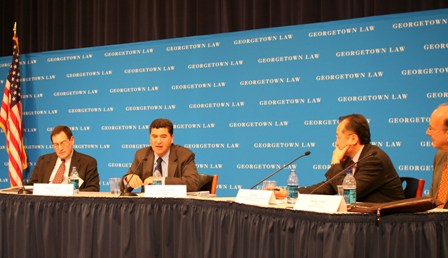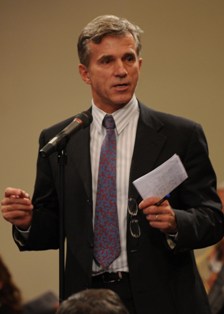Panels optimistic about health diplomacy
November - December, 2008 | Volume 7, Issue 6

Photos courtesy of Leslie Kossoff
Panelists, from left: Former Ambassador to Uganda Jimmy Kolker, former NIH
Director Dr. Elias Zerhouni, Harvard School of Public Health Prof. Dr. Jim Kim
and Fogarty Director, Dr. Roger Glass.
A sense of "profound optimism" about the role of science in advancing global health diplomacy pervaded a Fogarty-sponsored symposium on the subject held a week after the presidential election.
As part of its 40th anniversary celebration, Fogarty brought together two panels and an audience of more than 200 to the Georgetown Law Center in conjunction with the O'Neill Institute for National and Global Health Law, to examine the relationship between science and diplomacy and how U.S. efforts in this arena could be strengthened.
Fogarty Director Dr. Roger Glass suggested that the scientists around the globe trained through Fogarty programs--many of whom now hold leadership positions in their countries--already are engaged in global health diplomacy.
"I never thought of you as being diplomats...but in fact you are the best demonstration of the value of international research in building relationships overseas." He added that "Global health diplomacy is at work bridging borders that are very difficult to bridge through any other means."
Dr. Jim Kim, former director of HIV/AIDS for the World Health Organization and now a Harvard School of Public Health professor, argued that global health is a moral imperative. "We have to invest in global health out of self-interest to make sure that we can stop pandemic flu," he said. "It's an issue of national security, and it's a way to remake our relationship with the rest of the world."
A huge increase in scientific capacity is essential for success, according to former NIH Director Dr. Elias A. Zerhouni. Although Fogarty programs have trained about 5,000 scientists globally, he claims ten times that number are needed to support robust global health diplomacy.
"Diplomacy is a negotiation activity and good negotiations require a certain symmetry--a symmetry of knowledge, a symmetry of education, of values and goals," Zerhouni said. "If not, distrust and diplomatic failure will ensue." He cited the SARS crisis as an example. U.S. officials were able to work well with the new Chinese Minister of Health because he was surrounded by a dozen well-prepared advisers, half of them trained through Fogarty programs, Zerhouni reported.

Former Fogarty fellow
Dr. Thomas Zeltner
"A core strategic issue is how to develop sufficient and qualified local human capacity who can understand and practice the science needed to train and deploy effective and smart interventions and, more importantly, who can become real partners at the table of health diplomacy," he added.
The solution, Zerhouni said, lies in building a global network of research and training centers of excellence in the developing world in association with local institutions using common curricula, modern methods of education as well as a standardized approach to building scientific capacity.
A better prepared diplomatic corps would also enhance efforts, according to Jimmy Kolker, former U.S. ambassador to Uganda.
The only diplomat represented on the panels, he called for educational standards and a better defined career track for those entering the foreign service, particularly if they intend to work in the complex realm of global health policy. "Even hairdressers need to be licensed to do business," he said, and yet diplomats have no set performance standards or educational requirements.
Representing the private sector, Dr. Derek Yach, vice president of global health policy for PepsiCo and a former WHO executive, questioned the priorities and global health investment choices made by the U.S. government and others, doubting the wisdom of spending a thousand dollars to prevent each AIDS death and yet withholding the $20 needed to stop a nutrition-related death.
That doesn't mean AIDS treatment shouldn't be provided, he says. "But if we are at the point of doing AIDS treatment, we should at least be doing all the cost-effective ones that are below it and that would have a dramatic, larger impact on the MDGs (Millennium Development Goals)," he concluded.
O'Neill Institute Executive Director John Monahan, J.D., summed up: "I think there was a profound optimism underlying every person who spoke today...and I mean this in the most nonpartisan way possible, but I think there was a 'yes, we can' sense; there is a lot to do, and everybody here was talking about the possibilities and not the barriers."
To view Adobe PDF files,
download current, free accessible plug-ins from Adobe's website.